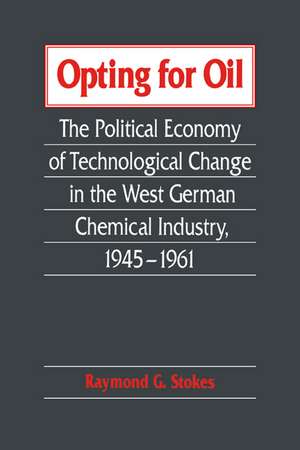Opting for Oil: The Political Economy of Technological Change in the West German Industry, 1945–1961
Autor Raymond G. Stokesen Limba Engleză Paperback – 19 apr 2006
| Toate formatele și edițiile | Preț | Express |
|---|---|---|
| Paperback (1) | 347.89 lei 6-8 săpt. | |
| Cambridge University Press – 19 apr 2006 | 347.89 lei 6-8 săpt. | |
| Hardback (1) | 538.70 lei 6-8 săpt. | |
| Cambridge University Press – 27 ian 1994 | 538.70 lei 6-8 săpt. |
Preț: 347.89 lei
Nou
Puncte Express: 522
Preț estimativ în valută:
66.58€ • 69.42$ • 55.33£
66.58€ • 69.42$ • 55.33£
Carte tipărită la comandă
Livrare economică 20 martie-03 aprilie
Preluare comenzi: 021 569.72.76
Specificații
ISBN-13: 9780521025768
ISBN-10: 0521025761
Pagini: 276
Dimensiuni: 155 x 233 x 14 mm
Greutate: 0.39 kg
Editura: Cambridge University Press
Colecția Cambridge University Press
Locul publicării:New York, United States
ISBN-10: 0521025761
Pagini: 276
Dimensiuni: 155 x 233 x 14 mm
Greutate: 0.39 kg
Editura: Cambridge University Press
Colecția Cambridge University Press
Locul publicării:New York, United States
Cuprins
Introduction; Part I. Background: 1. Politics and technological excellence: organic chemicals, 1860–1945: 2. Western German chemicals in flux, 1945–55; Part II. Bargaining from Strength: The Political Economy Of Technological Change, 1945–55: 3. A new agenda, 1949–55: Cold War, changing energy patterns and the development of West German chemical technology; 4. Rejoining the international community: international cooperation and technology transfer, 1951–5; Part III. Alternative Paths to Plenty: Case Studies from the mid-1950s: 5. Fifty-fifty with the petroleum multinationals: BASF, Shell, and Rheinische Olefinwerke; 6. Fifty-fifty with the petroleum multinationals: Bayer, British Petroleum, and Erdölchemie; 7. Going it alone: Hoechst; 8. State's interest and technological change: Hüls and cold-rubber technology; 9. End game strategies: the German coal industry and the Fischer–Tropsch process; Part IV. Consolidating the New Regime, 1957–61: 10. Petrochemicals triumphant, 1957–61; 11. Conclusion; Index.
Recenzii
'… finely crafted … fine achievement in scholarly analysis.' Nature
Descriere
An analysis of how the West German chemical industry regained and then retained a competitive position in world markets from 1945–61.










